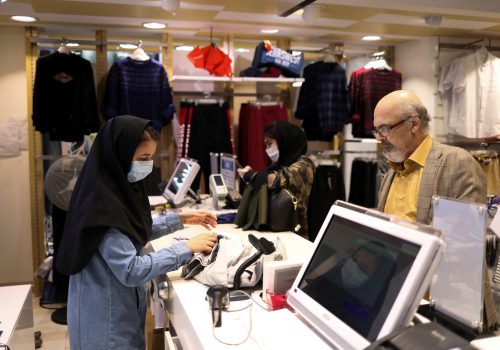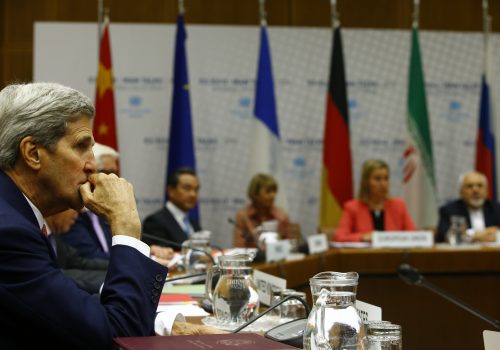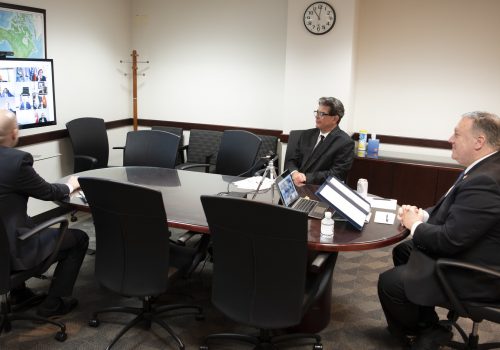After snapback sanctions on Iran: A European perspective
US President Donald Trump’s withdrawal from the Joint Comprehensive Plan of Action (JCPOA) in May 2018 made his vision for the nuclear accord crystal clear: he wants it dead. On September 20, the United States re-imposed United Nations sanctions on Iran through the snapback mechanism—at least according to the Trump administration.
For the time being, the course chosen by the Trump administration is leading to an unprecedented isolation of the United States. The letter sent by US Secretary of State Mike Pompeo to the UN Security Council on August 20 was considered invalid. Thus, the international community has not consented to the snapback process nor recognized the reestablishment of sanctions after thirty days. That pointedly includes the E3—France, Germany, and the United Kingdom—which negotiated the JCPOA along with China, Russia, the US and Iran.
This is not the first time the Trump administration has allowed itself the luxury of challenging the rest of the world in such a way. Nevertheless, we are witnessing a peculiar situation in which the US has created a parallel reality while the international community stands by an opposite legal reality. The “real reality” is, in fact, a whole other matter; in practice, extraordinarily little trade is possible with Iran due to re-imposed US sanctions. As a result, the US decision is largely symbolic.
The key question now is how Iran responds. Until a few months ago, one could anticipate that Iran would react by withdrawing from the JCPOA. Indeed, this seems to have been the US rationale for snapback—provoke Iran to go too far and destroy the nuclear agreement by its own hand.
This scenario now appears unlikely. First, Iran, along with the rest of the international community, agrees that the reestablishment of UN sanctions does not exist beyond the imagination of the Trump administration. Second, since January, the Islamic Republic seems to have adopted a relatively low-profile policy towards the US. It could be that the US assassination of Quds Force commander Qasem Soleimani in January convinced decision-makers in Tehran to be more cautious. It could also be that they are waiting for the November US elections.
In any case, Iran is still active in the region through the Islamic Revolutionary Guard Corps’ (IRGC) foreign arm, the Quds Force, and its proxies and is still expanding its uranium stockpile, albeit more slowly than last year. Iranian assertiveness in Syria, Iraq, Yemen, and potentially Lebanon, may still lead to incidents with US troops or, more generally, to miscalculations on one side or the other. There is also uncertainty about the potential Iranian response to the Gulf States’ recent overt rapprochement with Israel, which is a major setback for Tehran. It would be unlike Iran not to react to such a move. The same can be said about the arms embargo. The isolated US position is certainly satisfying for Iran, but this satisfaction could be tarnished if potential arms providers are reluctant to sell Iran what it wants.
The Trump administration invoked snapback after failing to get the UN Security Council to extend a UN arms embargo on Iran, which is due to expire on October 18 under the terms of the JCPOA. Starting from that point onwards, the US will not hesitate to apply US sanctions to states or entities that transfer armaments to Iran or Iranian structures engaged in the arms business.
As seen from Europe, which has its own continuing embargo on arms transfers to Iran through 2023, the Trump administration will likely not insist on imposing its parallel reality on reluctant allies. That is partly because the Americans are aware that such an endeavor would fail and partly because they have more pressing matters to deal with. The Trump camp seems to believe it has achieved a significant diplomatic victory by brokering normalization agreements between the United Arab Emirates, Bahrain and Israel.
Meanwhile, the E3 and the EU have preserved enough of the legal framework of the JCPOA to facilitate a possible return to the deal by a new Democratic administration. It took great efforts on the part of the Europeans to accomplish this, especially in keeping the Iranians at least partially on board when they were fuming about Europe’s inability to provide them with anticipated economic benefits.
In fact, it seems that the E3 has recently gained credibility in the eyes of the Iranians after they realized that Europe’s resistance to the US on the arms embargo and the sanctions was real. That is probably one reason why Iran ultimately decided to grant the International Atomic Energy Agency (IAEA) access to two suspected former nuclear sites, which they had refused to do until now.
How could the situation develop between the US and Europe?
If Donald Trump is re-elected, it is clear that there will be little room left for transatlantic cooperation on Iran. As far as Europe is concerned, this may be of secondary concern to what can be expected from a second Trump term, such as a possible intensification of the trade dispute, new attacks on the EU and NATO, or risky policies dealing with China and Russia. But one could adopt an optimistic view; that the architects of the “maximum pressure” strategy may realize that not having their allies on board is a big handicap for the implementation of their strategy.
If Joe Biden is elected, it does not necessarily mean that the Iran issue or the transatlantic relations around it will be easy to resolve. Biden is on record saying that he will seek to rejoin the JCPOA if he wins but only if Iran also returns to compliance. In that case, the crux of the issue surrounds double compliance, not just the US’s commitment to their obligations. The new administration will also want to enhance the agreement with a regional track and with negotiations on the sunset clauses of the JCPOA. This is fully in line with what French President Emmanuel Macron has suggested. However, until now, the Iranians have fiercely resisted these ideas.
In any case, from Europe’s perspective, there is the risk that a Biden administration will believe that it does not need European expertise because of the many likely Biden staffers that would have first-hand experience from serving under the Obama administration. Conversely, the incredibly volatile situation in the Middle East, the complexity of the issues related to the JCPOA, and new challenges—such as the China’s rising importance in the region—may make the role of the Europeans more useful than ever. During these difficult last four years, the E3 have proved capable of maintaining contact with all stakeholders, including China, Russia, Iran, and Israel. In fact, now may be the time more than ever to focus on specific points of cooperation between the US and Europe, especially if there is to be a new administration in Washington.
In the event of a renewed transatlantic dialogue, there are also Iranian political realities to consider. The “maximum pressure” policy has empowered Tehran’s hardliners, something that will only be magnified by the Iranian presidential elections in June 2021. The hardliners may reject new negotiations or focus on other priorities in them. The West would need to figure out how to adapt its approach to influence and work with a new Iranian leadership.
Second, there is the question of the consequences of Gulf-Israel rapprochement for future negotiations with Iran. The general assumption is that it will make Iran more isolated and provide the US with a stronger hand to deal with Tehran. However, by increasing tensions between Iran and its neighbors, this new paradigm could make the Biden administration’s task much more complicated. Or alternatively, could the Gulf states, reassured by this new guarantee from Israel, be more inclined to accept a regional security dialogue that includes Iran? This would indeed reflect the US and Europe’s common interests, but the right conditions need to be created for this scenario to happen.
In any case, whoever will be in charge in Washington could benefit from the European’s expertise and contacts in the region. At the same time, for all their strong diplomatic work, Europe certainly cannot achieve its objectives single-handedly. Thus, the case for US-Europe cooperation is clear.
Ambassador Michel Duclos a nonresident senior fellow at the Atlantic Council’s Rafik Hariri Center for the Middle East and a senior advisor to the Institut Montaigne. Follow him on Twitter: @MrjDuclos.
Image: U.S. Secretary of State Mike Pompeo speaks next to National Security Adviser Robert O'Brien, Commerce Secretary Wilbur Ross, Treasury Secretary Steve Mnuchin, Defense Secretary Mark Esper and U.S. Ambassador to the United Nations Kelly Craft, during a news conference to announce the Trump administration's restoration of sanctions on Iran, at the U.S. State Department in Washington, U.S., September 21, 2020. Patrick Semansky/Pool via REUTERS


